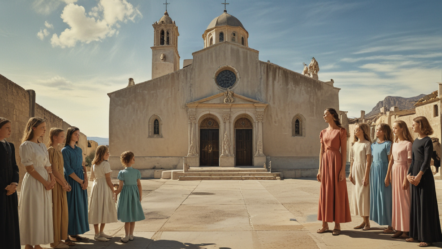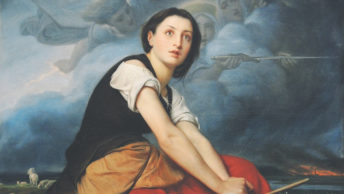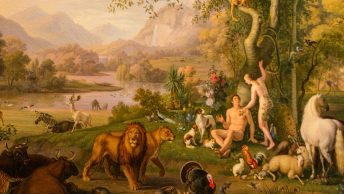Friday, March 8, 2024, marked International Women’s Day (IWD). This universal event celebrated the social, economic, cultural and political achievement of women.
One of the great advocates for women was certainly Pope St John Paul II. His precious teaching legacy gave us the correct understanding to evaluate and promote women in the way God wants them to be promoted. To begin with, women are both equal as well as different from men. Their equality stems from the fact that, with men, they are equal persons before God. Let us bring to our minds what his apostolic letter on the dignity and vocation of women on the occasion of the Marian Year, Mulieris dignitatem tells us: Both man and woman are human beings to an equal degree, both are created in God’s image (no.6). Women are also created in God’s image and likeness. Hence, they are endowed with the capacity of loving, and are also gifted with reason, free will and conscience.
Every woman is a unique gift of God by being a human person, particular person and a feminine person. The dignity of each woman stands in the fact that she is the living sacrament of love for the entire humanity. Mulieris Dignitatem says: Unless we refer to this order and primacy we cannot give a complete and adequate answer to the question about women’s dignity and vocation. When we say that the woman is the one who receives love in order to love in return, this refers not only or above all to the specific spousal relationship of marriage. It means something more universal, based on the very fact of her being a woman within all the interpersonal relationships which, in the most varied ways, shape society and structure the interaction between all persons – men and women. In this broad and diversified context, a woman represents a particular value by the fact that she is a human person, and, at the same time, this particular person, by the fact of her femininity. This concerns each and every woman, independently of the cultural context in which she lives, and independently of her spiritual, psychological and physical characteristics, as for example, age, education, health, work, and whether she is married or single (no. 29).
In Pope John Paul II’s view, women, together with men, have been created to fulfil their full capacity of what it signifies to be human. The apostolic letter Mulieres Dignitatem explains: It also means that man and woman, created as a “unity of the two” in their common humanity, are called to live in a communion of love, and in this way to mirror in the world the communion of love that is in God, through which the Three Persons love each other in the intimate mystery of the one divine life (no. 7).
Women are complementary to men because they are created in the Trinitarian image. Mulieres Dignitatem gives us this detail: In the Book of Genesis we find another description of the creation of man – man and woman (cf. 2:18-25) – to which we shall refer shortly. At this point, however, we can say that the biblical account puts forth the truth about the personal character of the human being. Man is a person, man and woman equally so, since both were created in the image and likeness of the personal God. What makes man like God is the fact that – unlike the whole world of other living creatures, including those endowed with senses (animalia) – man is also a rational being (animal rationale). Thanks to this property, man and woman are able to “dominate” the other creatures of the visible world (cf. Gen 1:28) (no 6).
Being a woman is a unique calling. Departing from the dual gender tradition Pope Wojtyła was extremely careful, highly responsible and justly appreciative of the feminine nature. In Mulieris Dignitatem he said: In the name of liberation from male “domination”, women must not appropriate to themselves male characteristics contrary to their own feminine “originality”. There is a well-founded fear that if they take this path, women will not “reach fulfilment”, but instead will deform and lose what constitutes their essential richness. It is indeed an enormous richness. In the biblical description, the words of the first man at the sight of the woman who had been created are words of admiration and enchantment, words which fill the whole history of man on earth (no. 6).
It is from such an understanding that stems the natural vocation for each woman to live in harmony with the particular qualities that are proper to her femininity. Filled with such admiration and thanksgiving Pope John Paul wrote in Mulieris Dignitatem: Therefore the Church gives thanks for each and every woman: for mothers, for sisters, for wives; for women consecrated to God in virginity; for women dedicated to the many human beings who await the gratuitous love of another person; for women who watch over the human persons in the family, which is the fundamental sign of the human community; for women who work professionally, and who at times are burdened by a great social responsibility; for “perfect” women and for “weak” women – for all women as they have come forth from the heart of God in all the beauty and richness of their femininity; as they have been embraced by his eternal love; as, together with men, they are pilgrims on this earth, which is the temporal “homeland” of all people and is transformed sometimes into a “valley of tears”; as they assume, together with men, a common responsibility for the destiny of humanity according to daily necessities and according to that definitive destiny which the human family has in God himself, in the bosom of the ineffable Trinity (no. 31).
We truly love, respect and promote women by allowing them to live what is theirs by God. When we help them live their unique feminine vocation, both in the society and in the Church, in complete harmony with that of men we give glory to God for the precious gift of femininity. It is in this way that we authentically can wish each and every woman, now and always, Happy Women’s Day.
Thank you Pope St John Paul II for your sterling and most actual reflection on the subject!








